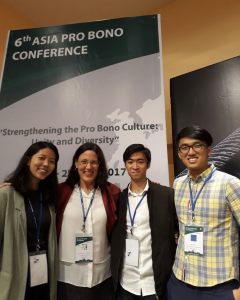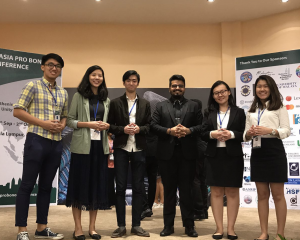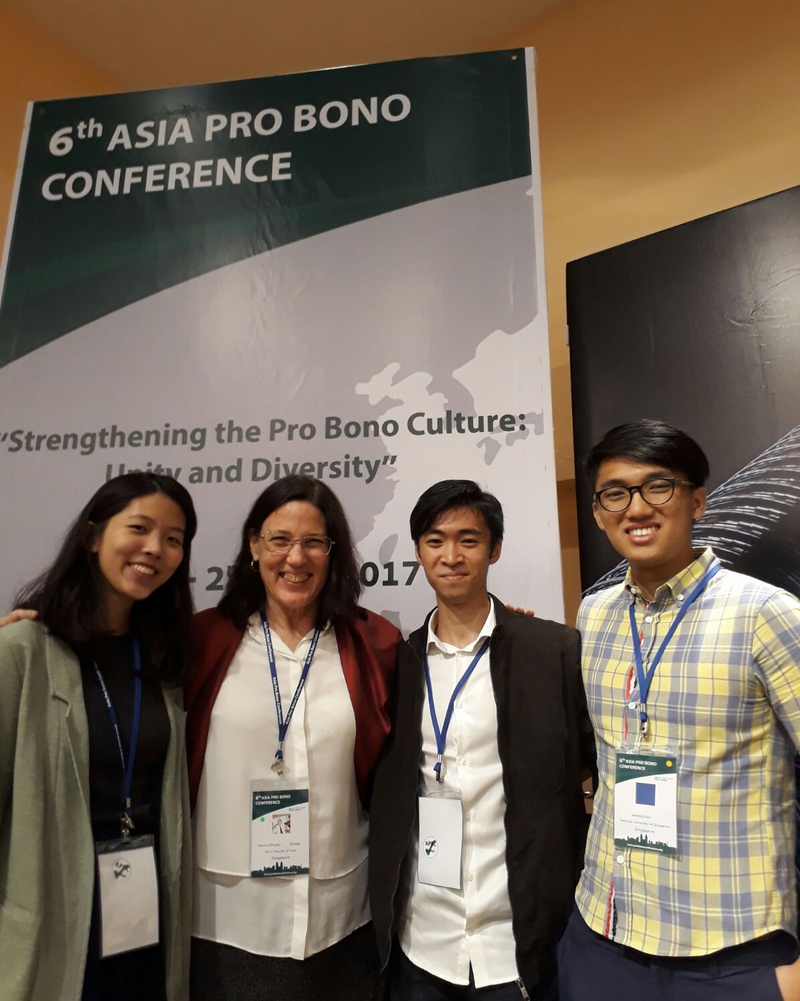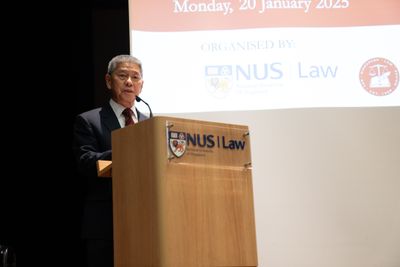The NUS Law Pro Bono Group (PBG) represented NUS Law at the 6th Asia Pro Bono Conference held in Kuala Lumpur, Malaysia. This year, many universities — such as those in Malaysia, Indonesia, Thailand and Vietnam — sent representatives to take part in the conference. Having benefitted greatly from the conference, we hope to share some of the conference highlights!
The conference, which was started in 2012, aims to promote greater access to justice in Asia. Various stakeholders in the field of pro bono are brought together for keynote speeches, plenary sessions, break-out discussions and interactive workshops. NUS PBG was privileged to be able to lead a break-out discussion, in which we mooted the idea of a Student Pro Bono Network Across Asia.
Pro Bono and Juvenile Justice: Moving Away from a Punitive Culture Towards Restorative Justice
This panel discussion involved critical discussion on the current state of the juvenile justice system in Malaysia, and made a cross-border comparison to restorative models of juvenile justice in the US.
An insightful distinction was drawn between retributive justice and restorative justice. While the former aims to punish the wrongdoer, the latter seeks to procure the offender to accept responsibility to repair the harm caused to the victim. The panel noted that the current state of Malaysia’s juvenile justice system was punitive in nature — a child offender is subject to a rigorous process of investigation, detention, trial and sentencing. Most children are also sent to prisons or approved schools run by the social welfare department.
The panel lauded recent amendments to the Child Act in 2016. Among many changes, the panel flagged out the prohibition of handcuffing children unless the child attempts to escape or resist, the right of every child to legal representation, as well as a “gag order” on news identifying child offenders or suspected offenders. As Malaysia shifts incrementally from retributive to restorative justice, it was also noted that restorative models have the added benefit of reducing the rate of re-offending among children.
In contrast, models in the US deliberately sought to insulate child offenders from the formal justice system by allowing disputes to be resolved outside of court. Examples of such models are victim/offender dialogues, peace circles, family group conferences and neighbourhood accountability boards. However, for the restorative model to work, both parties (victim and offender) must consent to meeting inter praesentes to broker a solution in the presence of a neutral third party, and the offender must accept responsibility for repairing the harm caused.
Regardless of the model of justice adopted, the panel emphasized the importance of preventing children from committing offences. Research showed that most child offenders were thrill-seekers who were unaware of the legal consequences of their actions. This affirms the relevance of NUS PBG’s Legal Education and Awareness Programme (LEAP) for youths-at-risk to prevent them from breaking the law and re-offending.

The NUS PBG Team at the 6th Asia Pro Bono Conference in KL
Pro Bono and the Fight Against Human Trafficking
This panel discussion comparatively explored the diverse ways various pro bono initiatives have tackled human trafficking. One of the ideas emphasised at this panel was that of pro bono initiatives being spearheaded and supported not only by lawyers, but also by legal service providers. The broader classification of legal service providers — which includes students, NGOs, and researchers — is important to pro bono as collective efforts amongst all these stakeholders make the process of pro bono more efficient.
At the panel, a representative from Liberty Asia, an NGO which prevents human trafficking through legal advocacy, technological interventions and strategic collaborations with NGOs and corporations in Asia, enlightened the audience on the different ways we can go about solving a humanitarian crisis.
While Liberty Asia engages in the traditional research on frameworks and the application of law in different jurisdictions, work that law students are familiar with, they also engage in other exciting research. For example, they have identified an influential target on the apex of the chain of demand — the investors. Investors wield trillions of dollars that can be invested into projects that might displace locals, causing them to be vulnerable to trafficking, or employ trafficked persons. The organisation conducts research with financial compliance professionals on these areas to reduce information asymmetry faced by investors, and enable investors to put their money into an ethical project.
Thus, research on financial laws, beyond trafficking laws, would also be useful for such a project. There is always room for everyone, regardless of expertise and interests, in solving this problem — you’d just have to get creative!
Mandatory Pro Bono: Solution or Problem? Maybe not so Black and White a Debate
NUS PBG’s Faculty Advisory, Professor Helena Whalen-Bridge, moderated a panel discussing the challenges of mandating pro bono among students and lawyers. The panellists included a pro bono director in an international law firm, a volunteer with BABSEACLE, and a CLAS associate. While the panel was divided as to whether a mandatory pro bono scheme was a bane or a boon, interesting arguments for and against mandating pro bono were raised.
For students, the main argument for mandatory hours is that compulsorily exposing students to pro bono work during their formative years of law school will (potentially) instil a pro bono culture in all law students. On the other hand, the panel lamented that students simply seeking to clear their mandatory pro bono requirement often put in minimal effort, resulting in unfairness to the beneficiaries whose cases may be affected.
As for lawyers, the main issue raised was the difficulty of enforcing a mandatory scheme among practitioners. Even if bar associations took on the burden of enforcement, this would be impracticable in less developed countries and might not receive popular support from lawyers. Law firms seeking to protect their bottom lines may also deride a mandatory pro bono requirement as siphoning off billable hours from lawyers. Yet, if mandatory hours were implemented for lawyers, it might encourage them to pursue community or criminal law. This is especially relevant in Singapore, where there is a lack of lawyers practicing in these areas.
There were creative suggestions from the floor, including setting an aspirational target for lawyers to reach, and incentivizing pro bono work, such as by having higher honorariums or building in pro bono requirements for partners in law firms. In Singapore, the importance of pro bono has been emphasised by Chief Justice Sundaresh Menon, and one notable result is that pro bono work will now be a consideration when lawyers here apply to be Senior Counsels.
Another suggestion encouraged law firms to set up dedicated pro bono departments in order to make pro bono work more efficient. However, this runs counter to the notion that all lawyers, not just a select few, have a professional duty to provide legal services to the community. Many preferred to involve all lawyers organically in pro bono work, rather than having some lawyers “specialize” in pro bono.
Even though the panel reserved definitive judgment on the matter, it was a fruitful discussion that forced us to think deeply about the way forward for mandatory pro bono in Singapore.

With our SMU counterparts after Day 1 of the Conference
Asia Student Pro Bono Network
Finally, the Asia Student Pro Bono Network is a collaborative project undertaken by the University of Queensland (UQ), University of Malaya (UM) and NUS Law. The aim of the session was to crowd-source ideas for the goals, outreach platforms and administration of an inaugural Asia Student Pro Bono Network.
Representatives from UQ, UM and NUS Law facilitated small-group discussions among students from across Asia. The idea of a network was received enthusiastically by attendees of the seminar, and the lively discussion generated thoughtful and viable propositions which helped lay the groundwork for the start of what we hope will be a valuable resource for student pro bono groups across the region.
It was truly heartening to see members of the pro bono community coming together to discuss live issues that cut across multiple jurisdictions. Hearing of the inspiring work happening around the region has reinvigorated us to continue developing the pro bono scene in NUS Law and beyond. Stay tuned for updates from NUS PBG on the Student Pro Bono Network!







